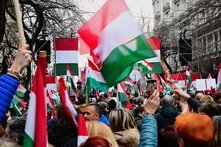Czech populists are on a roll, partly due to the antisocial policies of the country's right-wing government. While liberals put the blame on disinformation, the left continues to languish or to flirt with fascist ideas. And migrant-phobia has long become mainstream.

It is April 6, and the temperature is climbing past 30 degrees. The first street markets of the year are opening today on Malá Strana Square, in the heart of old Prague. Stalls are selling everything from Argentinian delicacies to organic lemonade. To reach them, however, you have to fight your way through hundreds of mostly young people who are not here for a snack. They are clutching banners such as "My body, my choice" or "We are the real pro-lifers".
Peter, from the Mater Noster student union, is yelling into a megaphone. "The so-called pro-life movement is not pro-life at all! We are the ones for social justice and workers' rights, it is us who are pro-life! Pro-life for women, pro-life for children, pro-life for queer people, pro-life with bodily autonomy, pro-life with love!" Meanwhile, a group of people in the front row are arguing about the verb tense of the Spanish "No pasaran" (“They shall not pass”).
With the pink flag flying over the stage, the crowd moves to block the nearby Legion Bridge. Some sit on the bridge deck, others stand hesitantly around the edge. The blockade is secured by two climbers who have scaled the bridge's cabling. The so-called March for Life, an annual anti-abortion parade, is not yet in sight but the crowd on the bridge is already chanting, "Clerico-fascism, filth and scum!"
The Czech government is making things easier for neo-fascists
April's blockade of the anti-abortion march, the fourth such protest, continues a tradition of counter-protesting neo-Nazi marches that began in the 1990s. Back then, the Czech far right still looked like the stereotypical image of a Nazi: shaved heads, boots and swastikas.
As political scientist Jan Charvát points out, it was easy to define oneself against the figure of the neo-Nazi skinhead. And this was true even for the part of society that shared some of their views – for example, of the Roma.
"For a long time the only ones who really spoke out loudly and clearly against the neo-Nazis were anarchists", points out Charvát. "But the anarchists also said: we are not civil society, we are against the state. So the anti-fascist blockades were presented in the media as a conflict between two extreme and marginal groups, as a fight between skinheads and punks that did not concern the ordinary person." Those blockades ended in 2007. Anarchists came to realise that neo-Nazis were going to the demos mainly to fight them, says Charvát.
In 2015, in response to the so-called migration crisis, the far right finally changed its tactics. Racism and antisemitism were replaced by Islamophobia; overt nationalism was replaced by "Euroscepticism"; and the call for direct democracy was replaced by a lean towards authoritarianism.
At their anti-refugee events, the speakers on the stage were men in suits. They managed to convince a part of society that the world is controlled by “unelected” non-governmental organisations. Across Europe there were demonstrations of solidarity with the Syrian refugees, but in Prague only a few dozen people showed up to advocate accepting them.
Indeed, opposition to refugees from the Middle East and Africa became a point of consensus in mainstream politics. The Czech Republic accepted a total of twelve refugees under EU quotas at the time. In this way the spectre of Muslim immigration soon ceased to function as a mobilising issue.
So the disinformation machine and the far right turned to other crises: the coronavirus pandemic and associated restrictions, the Ukraine war and the arrival of half a million of its refugees. And, not least, inflation.
All of these crises culminated at a time when real wages in Czechia had been declining consistently for more than two years. By late 2022 it had become the steepest such drop in the OECD.
The right-wing Czech government responded to this sustained impoverishment of the population with so-called "austerity" – i.e., a policy of cuts motivated by neoliberal ideology. This played into the hands of fascist currents in society. They were only too keen to blame the economic downturn on, among other things, aid to Ukraine and the government's opposition (however rhetorical) to Russian gas.
In September 2022, Jindřich Rajchl, a former member of the far-right movement Trikolóra, called an anti-government demonstration called Czechia Against Poverty. Its demands included the nationalisation of the energy firm CEZ, the abolition of the government's media and disinformation commissioner, and a halt in military aid to Ukraine. He filled Wenceslas Square: over 70,000 people came.
The moral superiority of Czech liberals
"We were all horrified that the fear-mongers managed to get so many of their supporters into Wenceslas Square", recalls Mariana Novotná of Milion Chvilek Pro Demokracii (“A Million Moments for Democracy”), a civic initiative that from 2017 organised massive protests – the largest since the 1989 revolution – against Andrej Babiš, Czechia's (indicted) conservative prime minister, businessman and media owner all rolled into one. "But we perceived a lot of economic fear. Czech society was afraid that there would be nothing to heat the house in winter. So we wanted to bring together people who, despite the fear, support a pro-European direction. To make it clear that none of us is alone in this."
They succeeded in some measure. Andrej Babiš had to resign and go into opposition. The October 2022 “Czechia Against Fear” demonstration was attended by a similar number of people as Jindřich Rajchl’s. But Novotná admits that the "Chvilkaři" are careful to limit their criticism of the government, lest they help Babiš or the far-right SPD.
When the group does take the government to task, it has been on topics such as disinformation or the conflict of interest of Justice Minister Pavel Blažek. "We had to narrow our focus. We don't focus on socio-economic issues. It's not our primary topic and we don't have the expertise," Novotná explains.
The main response of Czech liberals to the creeping advance of neo-fascism has been a patient effort to refute disinformation. Alas, this is often accompanied by a hint of moral superiority over the "uneducated masses", eloquently illustrated by the term “dezolát” ("deluded”) used to describe those who spread and endorse disinformation.
Liberals, both inside and outside the governing coalition, tend to downplay the fact that the government itself is driving its potential supporters into the arms of right-wing populists – through its anti-social policies, but also by its rhetoric suggesting that the dezoláti should have tried harder to be better educated and richer.
"These days they have nothing to sell but fear", comments Dave from the Illumicati initiative, whose members have been attending Rajchl's nationalist demonstrations with Ukrainian flags. "They are exploiting anti-government resentment among the less well-off, whose problems are easy to blame on the government. It's not that the government is doing everything right, but you have to wonder if part of the problem is self-inflicted."
Rather than its anti-refugee or anti-feminist rhetoric, what bothers Czech liberals most about today's fascist-adjacent populism is that it is often pro-Russian. The "anti-system" opposition is indeed loudly critical of the Czech government's Western-oriented foreign policy.
The woes of the Czech left
The social roots of neo-fascism are thus considered a priority only by a minority of today's progressive left, which generally prefers to attack (with justification) the right-wing populists over cultural issues such as abortion.
"We are not a political party and it is not our job to persuade anyone", argues Kryštof (real name withheld at his request) of Kolektiv 115, which co-organised the March for Life blockade. "We are pushing a politics based on working people, migrants, Roma and trans people. We reject the xenophobic idea of a generic 'working class' that is and always will be xenophobic."
That recent blockade mobilised a good number of people, but it was somewhat exceptional. "The right to abortion affects half the population", says sociologist Eva Svatoňová in explanation of the large turnout. "At the same time, it is a unifying issue on which the left and feminists agree. Moreover, we can easily see what the pro-life movement has done in the United States, Poland, Italy, and Slovakia."
Conversely, a demonstration in mid-March to mark the International Day Against Racism and Fascism was sparsely attended. The Czech left is languishing and remains divided. In 2021 it fell out of parliament completely for the first time, its voters syphoned off by the populist ANO movement of Prime Minister Andrej Babiš. The Social Democrats had foolishly chosen to take part in his coalition for two terms, and even the communists supported it for several years.
The situation is complicated further by the anti-migrant and anti-feminist rhetoric coming from conservative quarters of the Czech left. The vain belief is that this will help win back traditional left-wing voters and help the left become relevant again.
For their part, the so-called communists are running in this year's EU election alongside former members of Jindřich Rajchl's far-right movement. And it is becoming hard to keep track of Social Democrats who have defected to the right.
Bohumír Dufek, chairman of the Association of Independent Trade Unions, even spoke at Rajchl's demonstrations. Later, he invited a notorious disinformation-peddler, Daniel Sterzik, to a protest accompanying a teachers' strike – thus giving the mainstream media an excuse to talk about something other than the demands of the strikers.
Political scientist Ondřej Slačálek comments that "the role of the far right in our country has been taken over by a new current of conservatism, which comes from both the right and the left and which identifies itself against migrants, women, minorities and contemporary liberalism. As has been demonstrated by the failure [in Czechia] of marriage equality or the Istanbul Convention [on domestic violence], it has quite a lot of power."
HIs colleague Charvát believes that the Czech public's lethargy over the fascist threat stems primarily from their understanding of Czech history: "We consider ourselves to be a small nation, whereas in Europe we are more of a medium-sized one. There is a lingering sense that we are being manipulated, that we are stuck on the periphery between Russia and Germany."
This demobilisation was further fuelled in the 1990s by Václav Klaus, the right-wing prime minister and subsequent leader of the conservative Civic Democratic Party (ODS). "Klaus saw civic activism as usurping the political parties, which needed to win elections and so were the only legitimate actors deserving of support", adds Charvát.
A strong opponent
In the meantime, today's right-wing Czech government continues to bleed support: its approval rating currently hovers around 17 %. A year and a half before parliamentary elections, the return of Babiš as prime minister seems almost inevitable.
The question remains whether he will rule alone or in a coalition. Potential partners are the far-right SPD or the conservative ODS. The latter is the strongest party in the current government but joined it precisely thanks to a promise to remove Babis from power and "save Czech democracy". Its presence in government is nonetheless beneficial to powerful figures of the Czech oligarchy, so a post-election agreement between ODS and Babiš seems possible. Indeed, the spectre of a coalition of Babiš's ANO and the SPD may prove useful as an alibi that allows the ODS to rule with Babiš.
Whatever the outcome, the probability – bordering on certainty – is that the next Czech government will be unsympathetic to non-white refugees, subservient to the fossil-fuel oligarchy and agribusiness, and its priority will not be social cohesion. A takeover by the far right, as traditionally defined, is not imminent, although the next Babiš government may prove authoritarian. But something of the far-right worldview has long since seeped into Czechia's democratic mainstream. This will be harder to fight than a bunch of bald heads and boots.
In cooperation with voxeurop.eu.
The views and opinions in this article do not necessarily reflect those of the Heinrich-Böll-Stiftung European Union.
This article first appeared here: eu.boell.org


